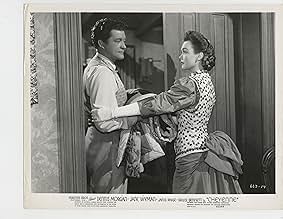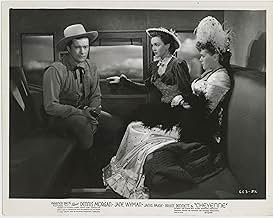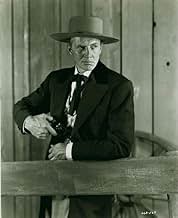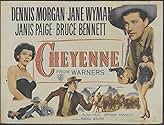Cheyenne
- 1947
- Tous publics
- 1h 39m
IMDb RATING
6.5/10
705
YOUR RATING
To avoid going to trial, a gambler becomes a detective for an insurance company to find out who is robbing the stages.To avoid going to trial, a gambler becomes a detective for an insurance company to find out who is robbing the stages.To avoid going to trial, a gambler becomes a detective for an insurance company to find out who is robbing the stages.
- Director
- Writers
- Stars
- Awards
- 1 win total
Anne O'Neal
- Miss Kittredge
- (as Ann O'Neal)
Robert Alderette
- Shotgun Rider
- (uncredited)
Hubert Brill
- Card Expert
- (uncredited)
- Director
- Writers
- All cast & crew
- Production, box office & more at IMDbPro
Featured reviews
Maybe if Bruce Bennet had played the Dennis Morgan role and Arthur Kennedy had done Bennet's I would have liked this film better. As it is, it's a bit too cute, cuddly, and rom comey for my taste, especially for a Raoul Walsh Western. Morgan, especially, seems miscast. I guess the producers wanted a charming rogue, the kind of character Gable or Garner coud play in their sleep, but Morgan comes across as just your standard song and dance man (who outsources the songs to Janis Page). You keep expecting Jack Carson to show up with the tuxes and top hats. And while the dialogue from Alan Le May and Thames Williamson has a generous supply of amusing one liners delivered by everyone in the cast the waggishness gets a bit much. I was hoping, for example, for at least some attempt to delve into the ambiguous, interesting Bennet/Jane Wyman relationship, only to be disappointed. And I really hate it when a great actor like Kennedy is consigned, as here, to cliche bad guy roles. Oh well. Paige sure is hot and sassy and Max Steiner's score is rousing (even if he repeats his central theme over and over and over). C plus.
PS...Alan Hale's cowardly sherriff is brought in about 75% of the way through, as if Walsh knew he had a dull dog on his hands and was desperately trying to liven things up.
PS...Alan Hale's cowardly sherriff is brought in about 75% of the way through, as if Walsh knew he had a dull dog on his hands and was desperately trying to liven things up.
Dennis Morgan was a very handsome dude and his acting was quite all right. Jane Wyman also already showed her acting talent in this movie. Outlaw bandits on horses robbing the stagecoaches or the banks were the typical major western genre since day one. Adding some convenient romance was also pretty typical arrangement for the handsome leading male and female characters was an inevitable ingredient almost in every western movie other than the gun fights or a final show down.
But what I have to point out again and again for the earlier western movies, the deafening, overly played soundtrack, the score, usually through those whole movies soon as the movies started. At that time, these movie companies used to hire contractual orchestras to play the music specifically scored for each movie. Boy Oh boy, weren't them not just loud and most of the time so inappropriate and exaggerated. Every scene would sync and combine with music, but most of the time, absolutely unnecessary and over-killed.
The soundtrack in this 1947 western was exceptionally loud, annoying and inappropriate, almost like military marching music specially drafted. The music in this movie undoubtedly can be used in those WWII war movies and might be more appropriate. Battleships sailed to battle with the German or Japanese navy forces, or bombers taking off one by one to cross the English Channel on the missions to bomb German military industries.
But for the mercy of God, instead of battleships or bombers set off to the battleground, the military like musical soundtrack in this film was used just on a stagecoach with only three passengers on it and one driver and one supporting shotgun beside him as well as several bandits on the horses rushing down the hill to rob the stagecoach. This kinda music and scores later were so blindly used on Walter Disney's cartoons to sync every movement of the cartoons' caricatures, making the western movies without any big difference from cartoons. For this movie, I have to turn down the volume almost to nothing to allow me to watch on.
But what I have to point out again and again for the earlier western movies, the deafening, overly played soundtrack, the score, usually through those whole movies soon as the movies started. At that time, these movie companies used to hire contractual orchestras to play the music specifically scored for each movie. Boy Oh boy, weren't them not just loud and most of the time so inappropriate and exaggerated. Every scene would sync and combine with music, but most of the time, absolutely unnecessary and over-killed.
The soundtrack in this 1947 western was exceptionally loud, annoying and inappropriate, almost like military marching music specially drafted. The music in this movie undoubtedly can be used in those WWII war movies and might be more appropriate. Battleships sailed to battle with the German or Japanese navy forces, or bombers taking off one by one to cross the English Channel on the missions to bomb German military industries.
But for the mercy of God, instead of battleships or bombers set off to the battleground, the military like musical soundtrack in this film was used just on a stagecoach with only three passengers on it and one driver and one supporting shotgun beside him as well as several bandits on the horses rushing down the hill to rob the stagecoach. This kinda music and scores later were so blindly used on Walter Disney's cartoons to sync every movement of the cartoons' caricatures, making the western movies without any big difference from cartoons. For this movie, I have to turn down the volume almost to nothing to allow me to watch on.
Dennis Morgan stars as Jim Wylie, gentleman gambler and fast gun in Cheyenne which by the look of it was a project originally intended by Warner Brothers for Errol Flynn. It has a lot more plot than most westerns of the day did. With Raoul Walsh directing and a score by Max Steiner it bares no small resemblance to the classic Flynn movie San Antonio which these gentlemen worked on as well.
Morgan got himself into a bit of a shooting scrape in Carson City and the law wants him there. But Wells Fargo detective Barton MacLane offers him a proposition, if he'll go undercover and smoke out a bandit known as 'the poet'. They'll square things with the law for Morgan if he helps out. Since that's the best offer he's had all day, he takes it.
His detective work takes him to Cheyenne where the poet is not only robbing Wells Fargo, but he's also taking trade away from other honest robbers like Arthur Kennedy as The Sundance Kid and his gang. Making the journey with him to Cheyenne are a pair of women who will figure prominently in Morgan's life for a period, Jane Wyman and Janis Paige.
Our poet is so named because he leaves a bit of verse at the scene of each robbery. Giving Wells Fargo the finger so to speak in rhyme.
Although the poet's identity is actually revealed early on, the film takes on a Columbo like twist as Morgan and the poet try to outsmart each other. That's the real heart of Cheyenne and why it's as good a film as it is.
Alan Hale, also a regular in Flynn films, is on hand as an oafish deputy sheriff, more the kind of part Andy Devine used to play. Hale does well in it though and his presence in the film convinces me even more that the film was originally intended for Errol Flynn.
Cheyenne is a well plotted adult type western, still with enough action for the Saturday afternoon matinée trade. It holds up very well after 62 years. Even if Errol Flynn didn't get to star in it.
Morgan got himself into a bit of a shooting scrape in Carson City and the law wants him there. But Wells Fargo detective Barton MacLane offers him a proposition, if he'll go undercover and smoke out a bandit known as 'the poet'. They'll square things with the law for Morgan if he helps out. Since that's the best offer he's had all day, he takes it.
His detective work takes him to Cheyenne where the poet is not only robbing Wells Fargo, but he's also taking trade away from other honest robbers like Arthur Kennedy as The Sundance Kid and his gang. Making the journey with him to Cheyenne are a pair of women who will figure prominently in Morgan's life for a period, Jane Wyman and Janis Paige.
Our poet is so named because he leaves a bit of verse at the scene of each robbery. Giving Wells Fargo the finger so to speak in rhyme.
Although the poet's identity is actually revealed early on, the film takes on a Columbo like twist as Morgan and the poet try to outsmart each other. That's the real heart of Cheyenne and why it's as good a film as it is.
Alan Hale, also a regular in Flynn films, is on hand as an oafish deputy sheriff, more the kind of part Andy Devine used to play. Hale does well in it though and his presence in the film convinces me even more that the film was originally intended for Errol Flynn.
Cheyenne is a well plotted adult type western, still with enough action for the Saturday afternoon matinée trade. It holds up very well after 62 years. Even if Errol Flynn didn't get to star in it.
It was all said above. This is a rewarding movie to watch with good depth. I'd just like to add that the removal of Arthur Kennedy half way through the film, just as Alan Hale finally makes an entrance, is interesting. It's almost as though Raoul was having a hard time with Mr. Kennedy and had a part written to replace him with the `Skipper's' dad.
The ending is a wee bit of a surprise only because just as it looks like thing may not turn out the way we expect them too, they do. Yes Mr. Walsh did make many memorable westerns (I've seen the majority of them) but it's almost as though he was trying to move into another direction with this picture. Weather audiences appreciated it or not are still to be seen.
Scotty Jensen Racine, WI. USA
The ending is a wee bit of a surprise only because just as it looks like thing may not turn out the way we expect them too, they do. Yes Mr. Walsh did make many memorable westerns (I've seen the majority of them) but it's almost as though he was trying to move into another direction with this picture. Weather audiences appreciated it or not are still to be seen.
Scotty Jensen Racine, WI. USA
Critics like Phil Hardy have tended to dismiss Cheyenne as the least of Walsh's Westerns. My own viewing suggests a reassessment is in order. I saw this movie with another Walsh title, the more highly esteemed Along The Great Divide, just afterwards and was struck by how much more interesting, playful and modern the former appeared. By contrast Divide seemed predictable and more schematic.
The barely concealed sexual nature of much of the banter between hero Dennis Morgan (Wylie) and the two women he encounters - particularly Jane Wyman (Ann) who, for a period, poses as his wife - as well as the episodic nature of the plot is what gives the film its particular flavour today.
Another attraction is that like other Walsh Westerns (Pursued, Colorado Territory etc) noir elements are also prominent in Cheyenne. The overriding tone is cynical and Morgan's own predicament, as a man who has to solve a crime to clear himself of his own past, brings with it a background air of persecution closely related to that other, typically urban, genre. Ann has the air of a femme fatale, while the Sundance Kid (another marvellously laid back performance by Arthur Kennedy) insinuates suitable menace. In fact, I found his demise somewhat surprising as I would normally expect such a strong character to last to the showdown at the end of the film.
One of the most impressive scenes in the film is when Wylie and Ann face the returning robbers in the ramshackle hut they have shared with them the night before. The gunfight that follows is done imaginatively, while Walsh's talent as director are fully on display as he creates suspense through cutting and framing. At this time Wylie and Ann are still carrying on the husband and wife pretence which adds a further level of tension to the proceedings.
If there is a problem with the film it is in the occasional jarring nature of tone. Scenes follow each other that are menacing, flirtatious and comic. This creates a feeling of unease for the viewer that was perhaps deliberate, but the sudden gear change can also just be disconcerting. The musical score is outstanding as is the cinematography and both add immeasurably to the quality of the production.
Dennis Morgan made more impact on me in this film than he ever has before - perhaps because I have never looked out for him in particular. Here he is surprisingly muscular, a worthy foil for the machinations of the chief villain The Poet. The Poet's precise relationship to his wife is one of the most intriguing aspects of the early part of the film. Morgan's own teasing relationship with the two women he meets on the stage (both at the start and again at the conclusion of the film - a nice circular touch) is also interesting and provoking. Far more than the stereotypical Good girl/Bad Girl duality that appears in B-Western plots, the two women represent something more sophisticated and interesting, something that keeps the viewer interested.
This may be a forgotten film today, but if you like Westerns it is one definitely worth making an effort to see. It is not on the level of Walsh's very finest work but is still a good film, one in which the varied plot line and adult 'knowingness'of the leads give great enjoyment.
The barely concealed sexual nature of much of the banter between hero Dennis Morgan (Wylie) and the two women he encounters - particularly Jane Wyman (Ann) who, for a period, poses as his wife - as well as the episodic nature of the plot is what gives the film its particular flavour today.
Another attraction is that like other Walsh Westerns (Pursued, Colorado Territory etc) noir elements are also prominent in Cheyenne. The overriding tone is cynical and Morgan's own predicament, as a man who has to solve a crime to clear himself of his own past, brings with it a background air of persecution closely related to that other, typically urban, genre. Ann has the air of a femme fatale, while the Sundance Kid (another marvellously laid back performance by Arthur Kennedy) insinuates suitable menace. In fact, I found his demise somewhat surprising as I would normally expect such a strong character to last to the showdown at the end of the film.
One of the most impressive scenes in the film is when Wylie and Ann face the returning robbers in the ramshackle hut they have shared with them the night before. The gunfight that follows is done imaginatively, while Walsh's talent as director are fully on display as he creates suspense through cutting and framing. At this time Wylie and Ann are still carrying on the husband and wife pretence which adds a further level of tension to the proceedings.
If there is a problem with the film it is in the occasional jarring nature of tone. Scenes follow each other that are menacing, flirtatious and comic. This creates a feeling of unease for the viewer that was perhaps deliberate, but the sudden gear change can also just be disconcerting. The musical score is outstanding as is the cinematography and both add immeasurably to the quality of the production.
Dennis Morgan made more impact on me in this film than he ever has before - perhaps because I have never looked out for him in particular. Here he is surprisingly muscular, a worthy foil for the machinations of the chief villain The Poet. The Poet's precise relationship to his wife is one of the most intriguing aspects of the early part of the film. Morgan's own teasing relationship with the two women he meets on the stage (both at the start and again at the conclusion of the film - a nice circular touch) is also interesting and provoking. Far more than the stereotypical Good girl/Bad Girl duality that appears in B-Western plots, the two women represent something more sophisticated and interesting, something that keeps the viewer interested.
This may be a forgotten film today, but if you like Westerns it is one definitely worth making an effort to see. It is not on the level of Walsh's very finest work but is still a good film, one in which the varied plot line and adult 'knowingness'of the leads give great enjoyment.
Did you know
- TriviaThe TV series Cheyenne (1955) starring Clint Walker was supposedly based on this film, although there is no actual connection beyond Warner Brothers' owning the title.
- GoofsWhen Ed Landers turned around to shoot uphill at James Wylie who was coming in behind him, his gun went off before he was turned halfway around, when it was still pointed at the ground.
- Quotes
The Sundance Kid: When are we gonna start workin' together?
James Wylie: I'll tell you when just as soon as I finish my honeymoon.
The Sundance Kid: You already had one.
James Wylie: We want another one. You know how women are - like bears, they never get enough honey.
- ConnectionsFeatured in Frances Farmer Presents: Wyoming Kid (1958)
- How long is Cheyenne?Powered by Alexa
Details
- Release date
- Country of origin
- Language
- Also known as
- La nuit du bivouac
- Filming locations
- Sedona, Arizona, USA(environs used for Wyoming locations)
- Production company
- See more company credits at IMDbPro
Box office
- Budget
- $1,929,000 (estimated)
- Runtime1 hour 39 minutes
- Color
- Aspect ratio
- 1.37 : 1
Contribute to this page
Suggest an edit or add missing content



































